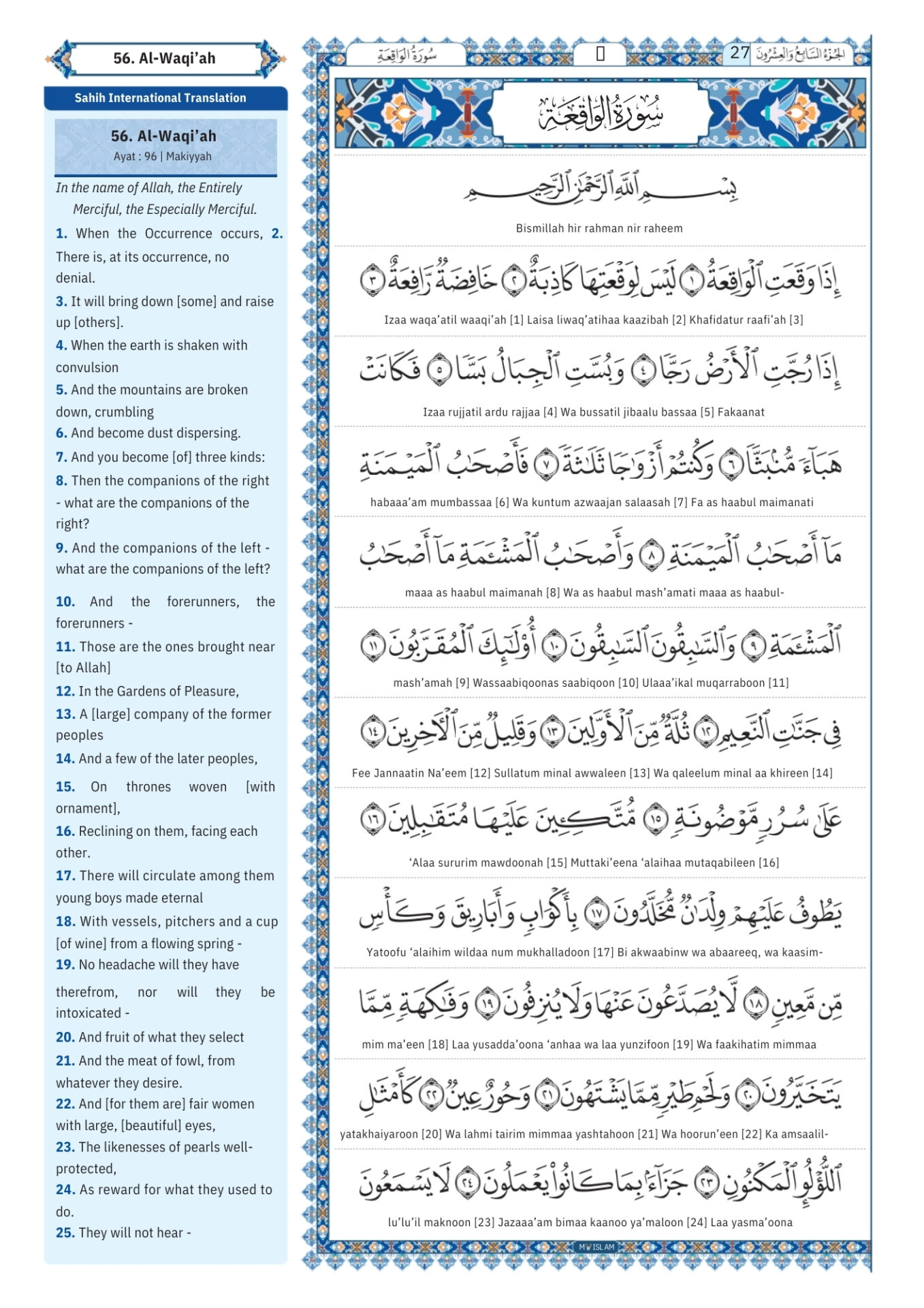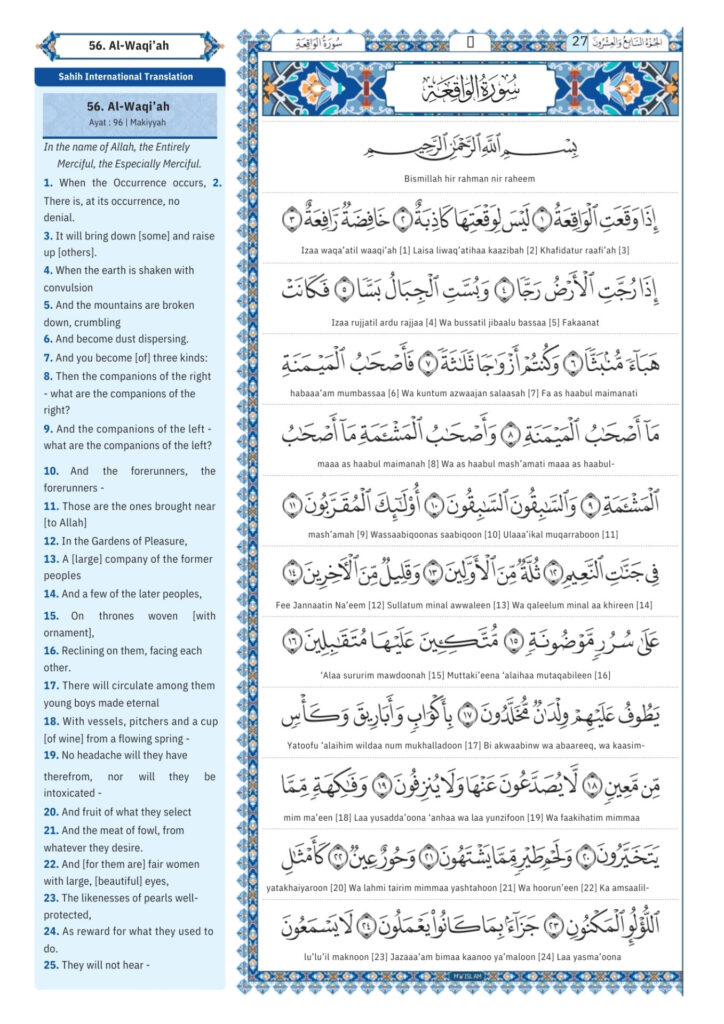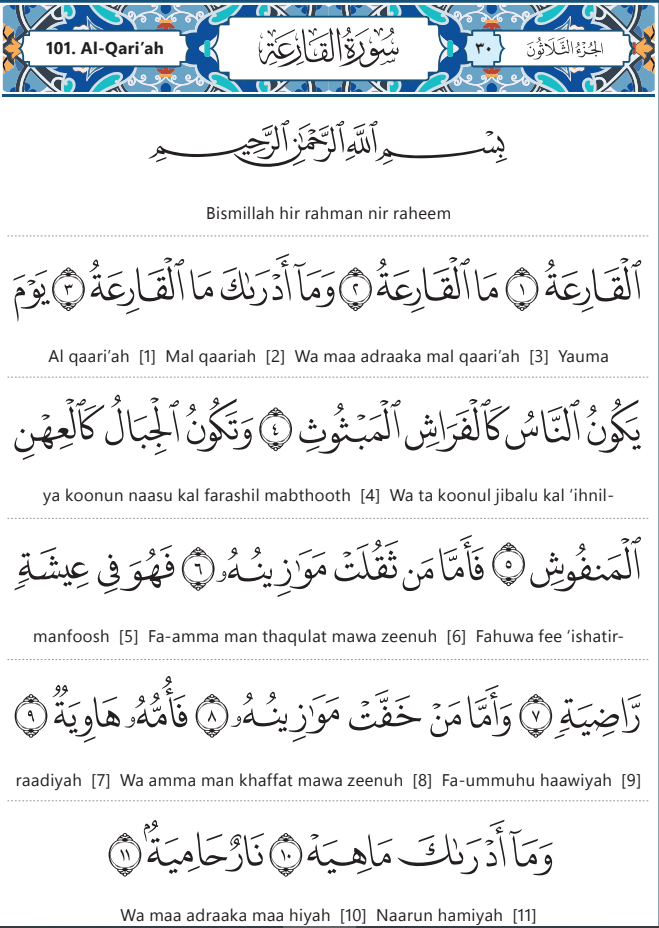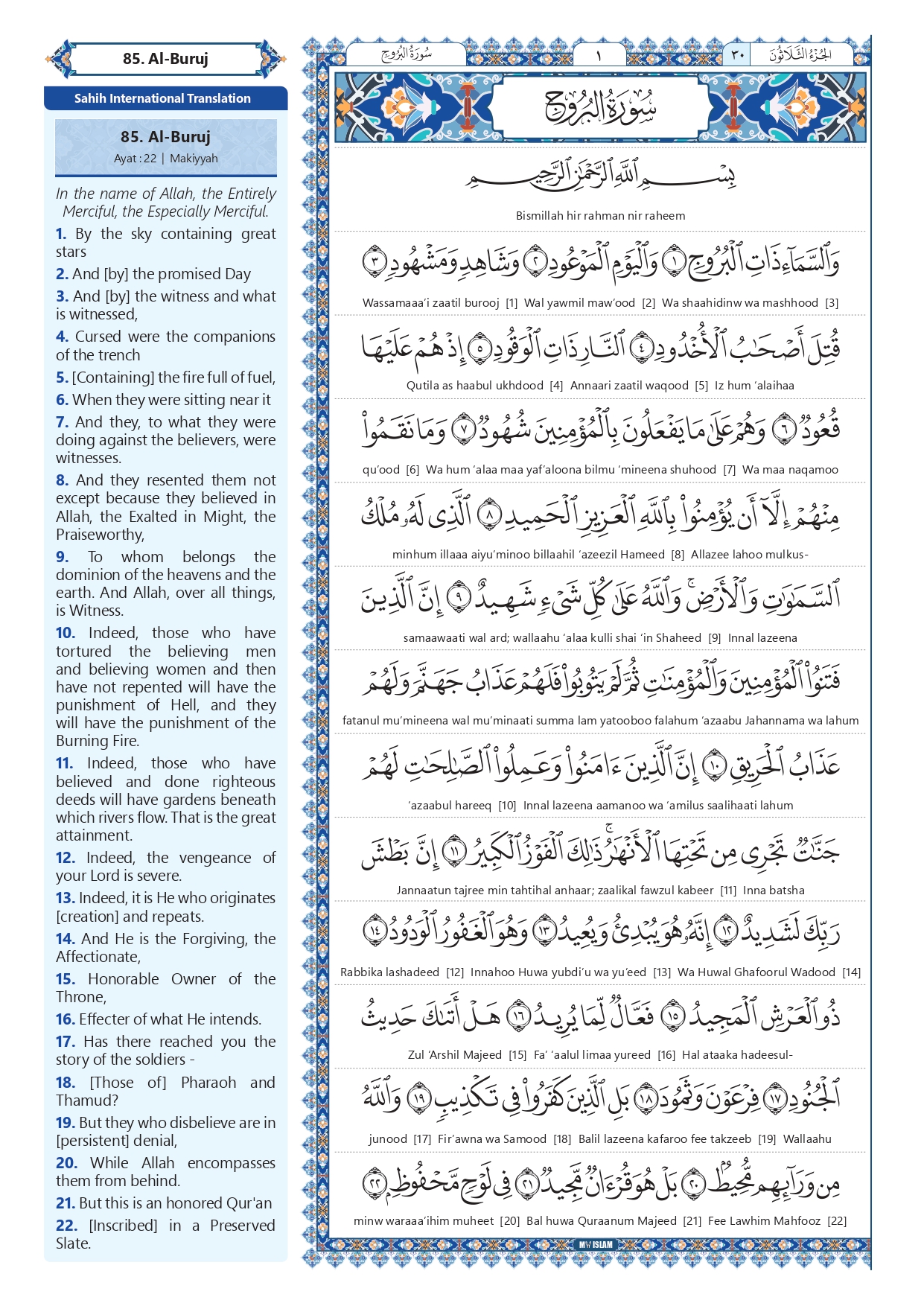Surah Waqiah in English Transliteration is a chapter of the Qur’an known for its profound messages about the realities of the Day of Judgment and the division of people into groups based on their deeds. As the 56th chapter of the Qur’an, it comprises 96 verses and was revealed in Mecca. The word “Al-Waqi’ah” translates to “The Event” or “The Inevitable,” signifying the certainty of the Day of Resurrection.
What is Surah Waqiah in English Transliteration?
Surah Waqiah in English Transliteration holds a special place in the hearts of many Muslims due to its vivid description of the Day of Judgment and the promise of rewards for the righteous. The chapter emphasizes that when the Day comes, people will be categorized into three groups: the companions of the right (the blessed ones), the companions of the left (the wretched ones), and the foremost in faith (the most exalted). The Surah serves as a reminder of the fleeting nature of worldly life and the eternal significance of one’s actions.
Surah Al-Waqi’ah:
Surah Al-Waqi’ah speaks of the hereafter with power and grace.
Read it often and let it prepare your heart with humility.

Keep Arabic-OM.com in your heart and your browser to revisit anytime.
Full Surah Waqiah in English Transliteration




Surah Waqiah in English Transliteration
A’uthu billahi min ash-shaytan ir-rajim
Bismillahir Rahmanir Raheem
- Itha waqa’ati al-waqi’ah
- Laysa liwaqa’atiha kathibah
- Khafidatun rafi’ah
- Idha rujjati al-ardu rajja
- Wa bussati al-jibalu bassa
- Fa kanat habaan munbatha
- Wa kuntum azwajan thalathah
- Fa as-habu al-maymanati ma as-habu al-maymanah
- Wa as-habu al-mash’amati ma as-habu al-mash’amah
- Wa as-sabiqoon as-sabiqoon
- Ulaa’ika al-muqarraboon
- Fee jannati an-na’eem
- Thullatun mina al-awwaleen
- Wa qaleelun mina al-akhireen
- ‘Ala sururin mawdoonah
- Muttaki’eena ‘alayha mutaqabileen
- Yatoofu ‘alayhim wildanun mukhalladoon
- Bi-akwabin wa abariqa wa ka’sin min ma’een
- La yusadda’oon ‘anha wa la yunzifoon
- Wa fakihatin mimma yatakhayyaroon
- Wa lahmi tayrin mimma yashtahoon
- Wa hoorun ‘een
- Ka-amthali lu’lu’in maknoon
- Jazaa’an bima kanoo ya’maloon
- La yasma’oona feeha laghwan wa la ta’theeman
- Illa qeelan salaman salama
- Wa as-habu al-yameeni ma as-habu al-yameen
- Fee sidrin makhdood
- Wa talhin mandood
- Wa dhillin mamdood
- Wa ma’in maskoob
- Wa fakihatin katheerah
- La maqtoo’atin wa la mamnoo’ah
- Wa furushin marfoo’ah
- Inna ansha’naahunna insha’a
- Faja’alnahunna abkaran
- ‘Uruban atraba
- Li as-habi al-yameen
- Thullatun mina al-awwaleen
- Wa thullatun mina al-akhireen
- Wa as-habu ash-shimali ma as-habu ash-shimal
- Fee samoomin wa hameem
- Wa dhillin min yahmoom
- La baridin wa la kareem
- Innahum kanoo qabla thalika mutrafeen
- Wa kanoo yusirroona ‘ala al-hinthi al-‘atheem
- Wa kanoo yaqooloona a-itha mitna wa kunna turaban wa ‘idhama a-inna lamab’oothoon
- Awa aba’oona al-awwaloon
- Qul inna al-awwaleena wal-akhireena
- Lamajmoo’oona ila meeqati yawmin ma’loom
- Thumma innakum ayyuhad-dalloona al-mukadhiboon
- La-akiloona min shajari min zaqqoom
- Fa malee’oona minha al-butoon
- Fa shariboona ‘alayhi min al-hameem
- Fa shariboona shurba al-heel
- Hatha nuzuluhum yawma ad-deen
- Nahnu khalaqnakum falawla tusaddiqoon
- Afara’aytum ma tumnon
- A-antum takhluqoonahu am nahnu al-khaliqoon
- Nahnu qaddarna baynakum al-mawt wa ma nahnu bi masbooqeen
- ‘Ala an nubaddila amthalakum wa nunshee’akum fee ma la ta’lamoon
- Walaqad ‘alimtumun-nasha’at al-oola falawla tathakkaroon
- Afara’aytum ma tahruthoon
- A-antum tazra’oonahu am nahnu az-zari’oon
- Law nashaa’u la ja’alnahu hutaman fa dhaltum tafakkahoon
- Inna lamughramoon
- Bal nahnu mahroomoon
- Afara’aytumul ma’a alladhee tashraboon
- A-antum anzaltumoohu mina al-muzni am nahnu al-munziloon
- Law nashaa’u ja’alnahu oojajan falawla tashkuroon
- Afara’aytumul narallatee tooron
- A-antum ansha’tum shajarataha am nahnu al-munshi’oon
- Nahnu ja’alnaha tathkiratan wa mata’an lil-muqween
- Fa sabbih bismi rabbika al-‘atheem
- Fa la uqsimu bi mawaaqi’in-nujoom
- Wa innahu laqasamun law ta’lamoona ‘azeem
- Innahoo laqur-aanun kareem
- Fee kitaabin maknoon
- Laa yamassuhoo illaa al-mutahharoon
- Tanzeelum mir rabbil ‘aalameen
- Afabihaazal hadeesi antum mudhinoon
- Wa taj’aloona rizqakum annakum tukazziboon
- Falaw laaa izaa balaghatil hulqoom
- Wa antum heena’izin tanzuroon
- Wa nahnu aqrabu ilaihi minkum wa laakil laa tubsiroon
- Falaw laaa in kuntum ghaira madeeneen
- Tarji’oonahaa in kuntum saadiqeen
- Fa ammaaa in kaana minal muqarrabeen
- Farawhunw wa raihaanunw wa jannatu na’eem
- Wa ammaaa in kaana min as-haabil yameen
- Fasalaamun laka min as-haabil yameen
- Wa ammaaa in kaana minal mukazzibeenad daalleen
- Fanuzulum min hameem
- Wa tasliyatu jaheem
- Inna haaza lahuwa haqqul yaqeen
- Fa sabbih bismi rabbikal ‘azeem
Surah Waqiah in English Translation:
- When the Occurrence occurs,
- There is, at its occurrence, no denial.
- It will bring down [some] and raise up [others].
- When the earth is shaken with convulsion
- And the mountains are broken down, crumbling
- And become dust dispersing,
- And you become [of] three kinds:
- Then the companions of the right – what are the companions of the right?
- And the companions of the left – what are the companions of the left?
- And the forerunners, the forerunners –
- Those are the ones brought near [to Allah]
- In the Gardens of Pleasure,
- A [large] company of the former peoples
- And a few of the later peoples,
- On thrones woven [with ornament],
- Reclining on them, facing each other.
- There will circulate among them young boys made eternal
- With vessels, pitchers and a cup [of wine] from a flowing spring –
- No headache will they have therefrom, nor will they be intoxicated –
- And fruit of what they select
- And the meat of fowl, from whatever they desire.
- And [for them are] fair women with large, [beautiful] eyes,
- The likenesses of pearls well-protected,
- As reward for what they used to do.
- They will not hear therein ill speech or commission of sin –
- Only a saying: “Peace, peace.”
- The companions of the right – what are the companions of the right?
- [They will be] among lote trees with thorns removed
- And [banana] trees layered [with fruit]
- And shade extended
- And water poured out
- And fruit, abundant [and varied],
- Neither limited [to season] nor forbidden,
- And [upon] beds raised high.
- Indeed, We have produced the women of Paradise in a [new] creation
- And made them virgins,
- Devoted [to their husbands] and of equal age,
- For the companions of the right [who are]
- A company of the former peoples
- And a company of the later peoples.
- And the companions of the left – what are the companions of the left?
- [They will be] in scorching fire and scalding water
- And a shade of black smoke,
- Neither cool nor beneficial.
- Indeed they were, before that, indulging in affluence,
- And they used to persist in the great violation,
- And they used to say, “When we die and become dust and bones, are we indeed to be resurrected?
- And our forefathers [as well]?”
- Say, [O Muhammad], “Indeed, the former and the later peoples
- Are to be gathered together for the appointment of a known Day.”
- Then indeed you, O those astray [who are] deniers,
- Will be eating from trees of zaqqum
- And filling with it your bellies
- And drinking on top of it from scalding water
- And will drink as the drinking of thirsty camels.
- That is their accommodation on the Day of Recompense.
The Importance and Benefits of Surah Al-Waqi’ah
- Protection from Poverty: It is widely narrated that reciting Surah Al-Waqi’ah regularly can protect a person from financial hardships.
- Reminder of the Hereafter: The vivid depiction of the afterlife in this Surah serves as a reminder to stay righteous and mindful of one’s actions.
- Spiritual Upliftment: Reading and understanding this Surah can bring tranquility to the heart and strengthen faith.
How to Memorize Surah Al-Waqi’ah
Tips for Memorization:
- Break It Down: Divide the Surah into smaller sections to make memorization manageable.
- Consistent Practice: Recite the sections you have memorized daily to retain them.
- Use Audio Aids: Listening to skilled reciters can help you learn proper pronunciation and intonation.
How to Recite Surah Al-Waqi’ah
Guidance for Recitation:
- Practice Tajweed: Focus on articulating every letter correctly with the rules of tajweed.
- Follow a Reciter: Shadow a well-known Qari to perfect your recitation style.
- Learn for Free with Us: Join our free Qur’an learning program to master Surah Al-Waqi’ah and many more chapters. [Insert Video Here]
Surah Waqiah in English Transliteration Word by Word
Breaking down the Surah word by word can deepen your understanding and enhance your ability to pronounce the verses correctly. This practice is especially helpful for non-Arabic speakers who wish to connect with the meaning of the Qur’an.
Read Surah Ad-Duha in English for more inspiration.
The Virtue of Reading Surah Al-Mulk at Night Before Sleeping
Likewise, reading Surah Al-Mulk at night before sleeping is a powerful Sunnah that protects from the punishment of the grave and intercedes for the reader. The Prophet Muhammad (peace be upon him) referred to it as “the protector and the savior from the punishment of the grave.”
You can read Surah Mulk in English transliteration here:
Learn the Qur’an with Us for Free
We offer free resources to learn the Qur’an, from word-by-word transliterations to video lessons that simplify the recitation process. Our mission is to make the teachings of the Qur’an accessible to everyone. With our guidance, you can learn to recite Surah Al-Waqi’ah and understand its powerful messages.
Surah Al Hadid in English Transliteration Read Surah al mumtahanah online 60
What is Surah Waqiah in English Transliteration?
Surah Al-Waqiah is one of the powerful Meccan surahs in the Quran, often recognized for its vivid description of the Day of Judgment. It divides people into three groups: the people of the right, the people of the left, and the foremost. Many people search for Surah Al-Waqiah in English to better understand its profound meanings, especially those who do not speak Arabic. For this reason, the English translation of this surah is highly sought after.
Surah Al-Waqiah in English
If you’re looking for the Surah Waqiah in English or the Surah Al-Waqiah English translation, many reliable websites offer an accurate translation of its meanings. The translation helps non-Arabic speakers understand the spiritual messages embedded in the surah, such as reminders of death, resurrection, and the reckoning.
Surah Al-Waqiah with Transliteration
In addition to the translation, some people prefer to read Surah Al-Waqiah transliteration—the Arabic text written in Latin script. This method makes it easier for non-Arabic speakers to pronounce the surah correctly, even if they don’t know how to read Arabic. This is often referred to as transliteration, allowing people to recite the surah with the proper phonetics.
Why Do People Search for Surah Waqiah in English Transliteration?
Many new Muslims or those who are not fluent in Arabic look for Surah Waqiah English transliteration because it helps them memorize and recite the surah accurately during prayers or daily dhikr (remembrance of Allah). It is also a valuable tool for children or language learners who want to start reading Quranic Arabic.
The Benefits of surah waqiah in english Transliteration
It is believed that Surah Al-Waqiah has great benefits, particularly in terms of livelihood and blessings. Some narrations (though their authenticity may vary) suggest that reciting this surah regularly can bring wealth and prevent poverty. For this reason, many people keep a version of Surah Al-Waqiah in English or with transliteration for daily recitation.
Frequently Asked Questions surah waqiah in english Transliteration
- What is the main theme of surah waqiah in english?
The Surah emphasizes the certainty of the Day of Judgment and categorizes people into groups based on their deeds. - How many verses are there in surah waqiah in english?
The Surah consists of 96 verses. - Is there a specific time to recite surah waqiah in english?
It is beneficial to recite this Surah regularly, particularly after Maghrib or before sleeping. - Does surah waqiah in english protect from poverty?
Yes, it is believed that regular recitation of Surah Al-Waqi’ah can safeguard one from financial distress. - How can I memorize surah waqiah in english effectively?
Break the Surah into sections, practice daily, and listen to recitations to reinforce memorization. - What are the spiritual benefits of reciting this Surah Waqiah in English Transliteration?
It brings peace to the heart, increases mindfulness of the afterlife, and reminds believers of their duties. - Why is this Surah called Al-Waqi’ah?
The name “Al-Waqi’ah” refers to the “Inevitable Event,” which is the Day of Judgment. - How does the Surah Waqiah in English Transliteration describe the Day of Judgment?
It vividly depicts the earth’s upheaval, the separation of people into groups, and the rewards or punishments they will receive. - What is the significance of the division into three groups?
The division signifies the varying outcomes for people based on their faith and actions. - Where can I find a video on how to recite Surah Waqiah in English Transliteration?
We will provide a video tutorial in this article to assist you with the proper recitation.
Conclusion: Surah Waqiah in English Transliteration
Surah Waqiah in English Transliteration serves as a powerful reminder of the Day of Judgment, where every soul will be recompensed according to their deeds. This Surah, with its vivid descriptions of the afterlife, urges us to reflect deeply on our actions and strive for righteousness. Through Surah Waqiah in English Transliteration, we are granted the ability to connect with the profound meanings of the verses, ensuring we can better prepare for the inevitable reality of the Day of Reckoning.
As we recite Surah Waqiah in English Transliteration, let us remember its powerful message: those who are steadfast in faith and good deeds will be rewarded, while those who neglect their duties will face the consequences. The beauty of Surah Waqiah in English Transliteration lies in its clarity, enabling every believer to understand the gravity of the coming events and to take heed from its powerful warnings and promises.




Pingback: Surahs to Read After Fajr: Spiritual Uplift and Morning Blessings -